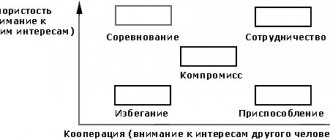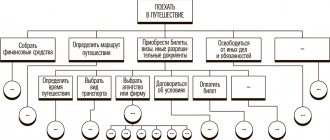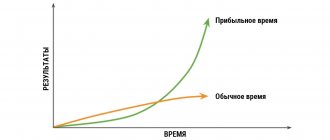Minimizing the number of tasks running simultaneously
Scientists at the University of Michigan have found that multitasking reduces a person's efficiency and makes him work slower.
Employees of the research Vanderbilt University confirm the statement of their colleagues - according to them, the human brain can work efficiently, performing no more than two tasks at the same time. Thus, to focus on business, writes Business Insider, you should reduce the number of tasks - and stop at just one or two.
How to learn to concentrate: simple tips
- Take short breaks. To make your brain more active and work better, you need to give it a little rest between tasks or even while performing one task. A short shift in attention will help fill you with energy. For example, if you don’t see a way to solve a problem, you don’t have the strength to study a boring subject anymore, the numbers in the reports don’t add up no matter how many times you count, then it’s better to take a short break and give your brain a rest. But it only takes a few minutes to avoid shifting your attention completely from the urgent task.
- Doing multiple tasks at the same time does not bring the desired results. Unfortunately, few of us are descendants of Julius Caesar, who supposedly could do several things at once. Multitasking is now very popular, but it does not lead to high-quality completion of every task. The more different information enters the brain, the more facts are lost from memory and attention. To do quality work, it is better to focus on one task at a time. You also need to plan your day. A clear schedule will help you keep your attention on each task for a certain time.
- Sometimes idleness is useful. To work quickly and efficiently, you need to allow yourself to rest. Everyone relaxes differently. This could be a hot bath after a hard day at work, reading a book, watching a movie, relaxing in nature on a day off, meeting with friends, meditation. In order for attention to work efficiently and for a long time, the brain definitely needs to reboot.
- also important to monitor your health. It is extremely difficult to concentrate on work if you feel unwell or tired. Poor health can be psychosomatic. The body, through illness, can indicate that the body needs rest. It is very important to listen to your own feelings and not overwork. Feeling good is the first step to developing attention. If something is bothering you in the body, the brain will automatically switch attention to the illness rather than to urgent work.
- Abstract yourself and get rid of external stimuli. If it is difficult to concentrate on completing a task, then you need to rid yourself of distractions as much as possible. Close social media tabs, turn off the sound on your phone, ask your colleagues not to touch you for a while, ask your husband to help with household chores. If you eliminate distracting details yourself in advance, you can complete the task faster and better.
Choosing a place where it is easiest to concentrate
Another conclusion that the researchers came to is that frequent job changes, the need to choose a new place, as well as solving related problems reduce the worker’s concentration.
It will be much more effective to choose in advance a place in which it is easy to concentrate, solve all technical issues (such as the position of the lamp or the arrangement of papers on the table) and work without changing it. Resolving any additional issues will take away the employee’s energy and impair his concentration.
I can not concentrate!
It can often seem that lack of attention is mainly a problem for people who work remotely: they are at home, no one supervises them, they can turn on a movie at any time, look at Instagram, text someone, call, go shopping . In such conditions it is easy to lose concentration.
However, this can affect everyone! A full-time job also comes with a lot of distractions, and it's easy for co-workers to engage you in time-consuming conversations. Access to the Internet may prompt you to visit sites that are not related to your responsibilities. Students and students also have problems with concentration.
Relaxation without distractions
Spending time doing nothing, writes Business Insider, is more useful than relaxing, spending time on a smartphone or on social networks - this has been proven by psychiatrists.
However, scientists from Harvard refute this thesis: in their opinion, it is not true for everyone. Most people of any age are uncomfortable being alone with their thoughts for even 15 minutes. Research involving respondents aged 18 to 77 years has shown that spending about 15 minutes in silence without gadgets makes it more difficult for a person to concentrate on further tasks.
What is concentration
Concentration is a kind of immersion in a process or situation. For example, when you read an interesting book, you become completely immersed in it, not noticing the time and what is happening around you.
To have good concentration, you need interest. There are situations in life when you don’t want to do something, but you have to. For example, in study or at work. You just need to study the entire course of lectures for the semester the night before the exam, and complete monthly reports at work on time. But attention is scattered on the film playing on TV, on telephone conversations, and you urgently want to choose a hotel for your vacation or a new blouse in an online store. In order not to be distracted by extraneous things, you need to learn to control your attention.
Bad advice
Just don’t listen to the smart guys who say that if your mind is tired of concentrating, you need to reduce the load on your head. This is really bad advice, because for a sound engineer, concentration is vital - and the more, the better. This develops it, renews it, and allows you to maintain vitality. If you like, this is even good for his health, because pleasure prolongs our life. And for a sound engineer, coming up with an idea, a formulation of a law of physics, a mathematical formula, a musical or literary work, developing a computer program or solving a mathematical problem is always a real pleasure. But the greatest pleasure lies in focusing on the human psyche, in realizing its hidden laws.
The potential of collective intelligence
“It’s impossible to be so excited about an idea all the time that you forget about sleep and food,” you object. And you'll be right. Although, of course, there are individuals whose strength of sound desire is such that one idea inspires them throughout their lives. But not all people are like that. In any business there is a routine. And inspiration may dry up. But only if the creative process is limited only by you.
Reaching a new level is possible if you make the most of the potential of the collective mind in your work. Here's how those who understand it write about it:
“For me, for example, freelance exchanges are a universal motivator from the first day of registration. I feel like I’m part of this large team of people, among them there are always many who are actively working, and this is a great stimulation.”
Yes this is true. Your creative potential is limited by your personal capabilities, and the potential of a group of like-minded people is exactly as many times greater as the number of participants in the project. That is why brainstorming has long been used in intellectual work, which allows you to see a problem in volume, from many points of view, collect ideas and quickly find a solution.
The general enthusiasm for the idea is contagious. Joint discussion gives inspiration, which must be immediately carried into work, implemented immediately and without delay. And this source of inspiration will never end, because there are many people. They are all different with different experiences, values, properties. Everyone sees the world differently. By uniting our views under the auspices of one idea, we get a product unprecedented in volume and quality.
Such experience was widely used in the early Soviet Union in the organization of “sharags”, where scientific workers not only created together, but also spent their free time together without interruption from the intellectual process. For Russia, such an experience is mentally acceptable, because we are collectivists, we like to do everything together.
But the leading corporations of Western countries, with their individualistic skin mentality, have already seen today that the future of intellectual work lies in teams. For example, Steve Jobs is considered the inventor of the iPhone, but in fact it is the fruit of the work of a huge number of specialists.
So, if you want your brain to always remain in good shape, look for a team that is close to you in spirit and the values that it brings to this world.
Motivation - idea
Many people realize that to turn on their brains they need motivation—an interest in what they are doing. This is true. And we begin to understand the mechanism of this phenomenon well at the System-Vector Psychology training.
The fact is that a person is, figuratively speaking, a desire for pleasure. And desire is an emptiness that requires filling. While this desire is there, a person does something in an effort to fill this emptiness and get pleasure. As soon as the emptiness is filled, the desire passes, and it is much more difficult for a person to force himself to do anything.
This can be compared to the fact that while a person is hungry, he moves, does something to get food. And as soon as he’s full, he immediately lies down on the sofa and wants to rest. A person becomes lazy, and in order to cheer himself up, he needs to get hungry again.
For a sound artist, pleasure is the process of thinking, and the desired result is the birth of an idea, a thought form. If he is captivated by an idea, he can work for hours, forgetting about sleep and food. But as soon as the idea is realized, a state of emasculation may arise, when a new lack, a new desire must accumulate, so that one again wants to concentrate the thought.
To ensure that the process of creativity and involved work does not stop, it is possible and necessary to use the shortcomings of other people. Our own desire is finite and ceases to be felt as soon as we fill it. Therefore, the pleasure of realizing only your desires is rather fleeting. When we do something for others, we are constantly fed with inspiration. Therefore, as soon as you feel a loss of concentration, go out of your solitude into the world to watch people, catch up on the news - in general, bring your mind to focus on those around you. To create something, you need to have an application point, to do it for someone. And these are always other people. In them you will see something that will spur your mind to work further.
By the way, for many sound engineers the most productive time of work is at night. And this factor can also be used in work.
How to concentrate on one thing and not get distracted?
Prepare a notepad and pen
Two simple tools to help you stay focused. At the beginning of the day, you should make a list of things that you want and need to accomplish. While you're doing them, you may suddenly remember other important things to do, so it's always a good idea to have a pen and paper with you. It is important! After all, until you write down what comes to mind, you won’t be able to fully concentrate on one thing.
“Yes, I already remember everything, there’s no need for me to write it down!” or “What else! I have an excellent memory!” - some will say. Okay, keep wasting your mental energy by going over your to-do list in your head. And then don’t blame everyone for your absent-mindedness.
Eliminate any distractions
App notifications, email, alert sounds. If you know that most of your time is spent communicating with friends in instant messengers, turn off notifications, the Internet, or exit the application. If unscheduled conversations unsettle you, turn off your phone. If you can’t resist the temptation to visit your favorite sites before working on your computer, turn off the Internet (if your work allows it).
Some people listen to music while performing their duties. But understand - instead of working, you are singing along to the artist track after track. It's better to work in silence. If you really want to, listen to Mozart’s compositions before work. They say it helps improve performance.
While doing one thing, don’t try to do another at the same time.
Today there is a lot of talk about multitasking and switching attention.
SINCE WE LOSE A LOT OF TIME WHEN SWITCHING, ALL THE JOBS YOU DIVIDE YOUR ATTENTION AMONG END MOVE SIGNIFICANTLY SLOWER THAN IF YOU PERFORMED THEM ONE AFTER ANOTHER. THIS IS FAIR EVEN FOR MECHANICAL WORK AND MUCH MORE DESTRUCTIVE FOR QUALITATIVE SOLUTION OF COMPLEX INTELLIGENT PROBLEMS.
So let's try to complete one task at a time, and start the next one only when we finish the previous one.
Remember to rest and eat healthy foods
It's much harder to concentrate on a task when you're tired. You should always remember to rest. This is really important because the brain and body need to recover, otherwise they will not work at full capacity.
In addition, diet also affects our concentration. The healthier the food, the better. Don't forget to enrich it with fruits and vegetables. Always have water with you - dehydration can be the enemy of your attention.
Check out the article: Foods to Improve Brain Function
Also remember to take breaks. Concentration does not last forever, and the longer you perform your duties without breaks, the faster you will become tired and lose concentration. From time to time, step away from the computer or simply the place where you work.
Sit in silence, have a healthy snack, look at nature. If possible, do some warm-up and eye exercises. A short break will help you quickly get into shape.
- Work in the “40 to 20” mode (40 minutes – intensive work, 20 – rest in complete “disconnection from work”)
- Sleep at least 8 hours a night
- Go to bed no later than 23:00
- Eat right
- Drink more water
Relax
It happens that we are very worried about our responsibilities. We are afraid that something will not work out for us, we will not meet the deadline, something will go wrong, the boss will get angry, we will definitely be fired... The more stress, the more difficult it is to concentrate. Our thoughts get confused and instead of the task we concentrate on our fears.
Excessive tension is not your ally. First of all, let's think about whether this will lead to the end of the world? There's nothing you can do about it? In most cases, there is always a way out. If you feel growing anxiety, open the window, breathe deeply, calm down, and go for a walk. The more relaxed you are, the easier it will be to concentrate.
Why it is useless to measure concentration time
You've probably read at least one article complaining that people are losing their ability to concentrate in the digital age. Most often they write that the average duration of concentration decreased from 12 seconds in 2000 to 8 seconds in 2013. That is, now, as bloggers and journalists tell us, goldfish remain focused longer than us - for 9 seconds.
These figures were quoted by many influential publications, usually pointing to a study by the Canadian Microsoft and not noticing that it refers to the Institute for Statistical Brain Research, which refers to other sources. Fortunately, there were people who dug deeper. It turned out that these figures were taken The Attention Span Statistic Fallacy out of thin air and are not confirmed by any scientific data.
The reliability of this statement is also questionable because from a psychological point of view, the concept of average duration of concentration does not make sense.
How long we can concentrate depends too much on context for generalized numbers to be of little practical use.
As psychologist Gemma Briggs notes, Busting the attention span myth, everything is connected to a specific task and human condition. And this is logical. My ability to concentrate changes throughout the day. If in the morning I can write for 2 hours without stopping, it is almost impossible to achieve such a feat in the afternoon. In addition, attention behaves differently depending on how much effort the task requires. For example, reading a scientific paper is not the same as reading a gripping thriller.
So all is not lost; your concentration has not completely disappeared. Yes, it may be difficult for you to pay full attention to one thing for a long time, but this does not mean that your brain is broken. Most likely, the ability to concentrate has not changed all that much in the 21st century, it’s just that new living and working conditions exacerbate the brain’s natural tendency to become distracted.











